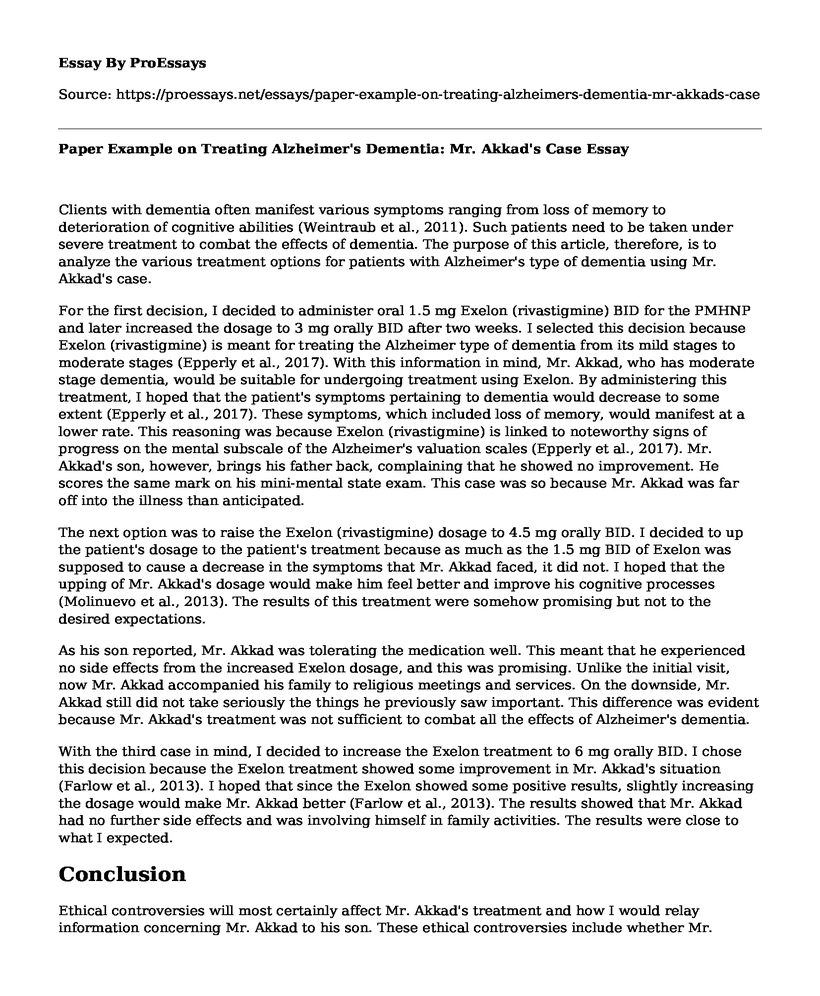Clients with dementia often manifest various symptoms ranging from loss of memory to deterioration of cognitive abilities (Weintraub et al., 2011). Such patients need to be taken under severe treatment to combat the effects of dementia. The purpose of this article, therefore, is to analyze the various treatment options for patients with Alzheimer's type of dementia using Mr. Akkad's case.
For the first decision, I decided to administer oral 1.5 mg Exelon (rivastigmine) BID for the PMHNP and later increased the dosage to 3 mg orally BID after two weeks. I selected this decision because Exelon (rivastigmine) is meant for treating the Alzheimer type of dementia from its mild stages to moderate stages (Epperly et al., 2017). With this information in mind, Mr. Akkad, who has moderate stage dementia, would be suitable for undergoing treatment using Exelon. By administering this treatment, I hoped that the patient's symptoms pertaining to dementia would decrease to some extent (Epperly et al., 2017). These symptoms, which included loss of memory, would manifest at a lower rate. This reasoning was because Exelon (rivastigmine) is linked to noteworthy signs of progress on the mental subscale of the Alzheimer's valuation scales (Epperly et al., 2017). Mr. Akkad's son, however, brings his father back, complaining that he showed no improvement. He scores the same mark on his mini-mental state exam. This case was so because Mr. Akkad was far off into the illness than anticipated.
The next option was to raise the Exelon (rivastigmine) dosage to 4.5 mg orally BID. I decided to up the patient's dosage to the patient's treatment because as much as the 1.5 mg BID of Exelon was supposed to cause a decrease in the symptoms that Mr. Akkad faced, it did not. I hoped that the upping of Mr. Akkad's dosage would make him feel better and improve his cognitive processes (Molinuevo et al., 2013). The results of this treatment were somehow promising but not to the desired expectations.
As his son reported, Mr. Akkad was tolerating the medication well. This meant that he experienced no side effects from the increased Exelon dosage, and this was promising. Unlike the initial visit, now Mr. Akkad accompanied his family to religious meetings and services. On the downside, Mr. Akkad still did not take seriously the things he previously saw important. This difference was evident because Mr. Akkad's treatment was not sufficient to combat all the effects of Alzheimer's dementia.
With the third case in mind, I decided to increase the Exelon treatment to 6 mg orally BID. I chose this decision because the Exelon treatment showed some improvement in Mr. Akkad's situation (Farlow et al., 2013). I hoped that since the Exelon showed some positive results, slightly increasing the dosage would make Mr. Akkad better (Farlow et al., 2013). The results showed that Mr. Akkad had no further side effects and was involving himself in family activities. The results were close to what I expected.
Conclusion
Ethical controversies will most certainly affect Mr. Akkad's treatment and how I would relay information concerning Mr. Akkad to his son. These ethical controversies include whether Mr. Akkad's family should withhold the truth from him if he gets worse or be open with him. These controversies may arise because such vital information may have a negative effect on the treatment progress and the overall health of Mr. Akkad. If Mr. Akkad's condition worsens, another issue may arise regarding whether the family should continue with the treatment knowing well that Mr. Akkad will not make it or stop the medication. These reasons are why Mr. Akkad's son needs therapy and guidance on how to treat Mr. Akkad.
References
Epperly, T. D., Dunay, M. A., & Boice, J. L. (2017). Alzheimer's disease: pharmacologic and nonpharmacologic therapies for cognitive and functional symptoms. American Family Physician, 95(12), 771-778.https://www.aafp.org/afp/2017/0615/p771.html
Farlow, M. R., Grossberg, G. T., Sadowsky, C. H., Meng, X., & Somogyi, M. (2013). A 24week, randomized, controlled trial of rivastigmine patch 13.3 mg/24 h versus 4.6 mg/24 h in severe Alzheimer's dementia. CNS Neuroscience & Therapeutics, 19(10), 745-752. https://onlinelibrary.wiley.com/doi/pdf/10.1111/cns.12158
Molinuevo, J. L., Grossberg, G., Frolich, L., Galvin, J., Krahnke, T., & Strohmaier, C. (2013). Predictors of response to the 13.3 and 9.5 mg/24 h rivastigmine patch: The optimizing/INS; transdermal Exelon in mild-to-moderate Alzheimer's disease (optima) study. Journal of the Neurological Sciences, 333, e336. DOI: https://doi.org/10.1016/j.jns.2013.07.1243
Weintraub, D., Somogyi, M., & Meng, X. (2011). Rivastigmine in Alzheimer's disease and Parkinson's disease dementia: an ADAS-cog factor analysis. American Journal of Alzheimer's Disease & Other Dementias, 26(6), 443-449.https://journals.sagepub.com/doi/full/10.1177/1533317511424892
Cite this page
Paper Example on Treating Alzheimer's Dementia: Mr. Akkad's Case. (2023, Jun 06). Retrieved from https://proessays.net/essays/paper-example-on-treating-alzheimers-dementia-mr-akkads-case
If you are the original author of this essay and no longer wish to have it published on the ProEssays website, please click below to request its removal:
- Public Reporting of Medical Errors - Paper Example on Public Health
- Abortion Coverage Debate Paper Example
- Interview of Nurse Educator and Clinical Nurse Educator Paper Example
- The Princess and the Pea by Andersen Essay Example
- Vegan Diet Essay Example
- Essay Example on Substance Abuse in Adolescents: Impact of Nicotine
- Bioethics: A Global Concern for Human Beliefs & Values - Essay Sample







